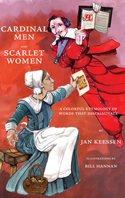Open Book
By Ruth E. Kott, AM’07
 A single word can offend, and reveal a person’s prejudices. Other words hide their histories and the biases they were born from. Take the verb maroon, for example: today we hear about someone “marooned” on an island, but the word came from the French marron, meaning “fugitive from slavery.” It later came to describe someone who had been abandoned for punishment, writes by Jan Keessen, AM'84, PhD'91, in Cardinal Men and Scarlet Women: A Colorful Etymology of Words that Discriminate (Marquette University Press, 2009).
A single word can offend, and reveal a person’s prejudices. Other words hide their histories and the biases they were born from. Take the verb maroon, for example: today we hear about someone “marooned” on an island, but the word came from the French marron, meaning “fugitive from slavery.” It later came to describe someone who had been abandoned for punishment, writes by Jan Keessen, AM'84, PhD'91, in Cardinal Men and Scarlet Women: A Colorful Etymology of Words that Discriminate (Marquette University Press, 2009).
An English professor at Augustana College, Keessen studies word histories, and this book provides etymologies for words that have a history of discrimination. Each short, encyclopedic entry is grounded in the Oxford English Dictionary, writes Keessen in the introduction: “the ultimate authority for any etymologist.”
Excerpted from Cardinal Men and Scarlet Women:
A lady is a woman of refined habits and gentle manners, so who’d ever think she started out up to her elbows in bread dough? Curiously, the word lady comes from the Old English hlæfðige meaning “loaf kneader.” She must have made some very tempting bread for it required a “loaf guardian” to oversee it, or a hlafweard which eventually gave us the word lord. We can assume the lord and lady were an ambitious pair because, in time, they abandoned common bread for the well-bred.
By medieval times a lady was no longer a servant, but one who cultivated breeding, manners, and culture. Polite, dignified, and virtuous, she was regarded as a feudal superior, one who held authority over castle and community. Meanwhile a lord had become lord of the manor, an aristocrat with power. Both could be charitable and enlightened. Or they could be real crumbs. ...
But lady has fallen into serious disfavor, especially among feminists who don’t necessarily want to behave like a lady. For them, the word lady smacks of class, manners, and virtuous sexual restraint. So feminists prefer woman, a word that strikes them as far more equitable and independent.
